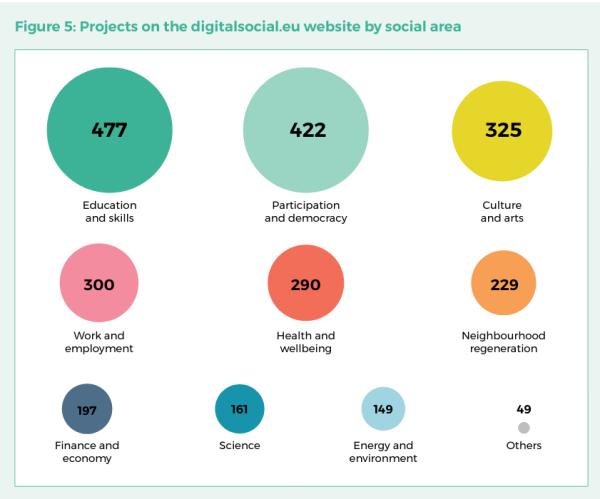Digital social innovation: Recommendations
Give Digital Social Innovation some love!

This is a synthesis of the final recommendations of a 2017 report What’s next for Digital Social Innovation. My own synthesis of the executive summary of the report is here, together with the reason why I am publishing these posts.
1: Support DSI through funding mechanisms
Since DSI has promising applications in almost all social areas, (social) funders should ensure that organisations using technology-led, collaborative approaches to tackle social challenges can access funding.
2: Invest in intermediaries and the support infrastructure for DSI.
There is no shortage of promising DSI projects, but there is little support to help the most promising grow into sustainable initiatives delivering impact at scale. Therefore, policy and funding at the European and national levels should focus support on intermediaries and support organisations such as incubators, accelerators, event organisers, meetups, networks, physical hubs, and training initiatives.
3: Invest in and enable DSI approaches within EXISTING civil society organisations
(if you ask me, THIS is the biggest and most urgent issue! And it’s also the one where I would love to work more. So I’m copying this almost verbatim)
Most funding and support for DSI has focused on startups, grassroots projects and new organisations, with little support directed towards existing and established civil society organisations. However, these organisations have an in-depth understanding of social challenges, existing initiatives and local contexts, and their involvement would accelerate the growth of DSI and its impact. On the one hand, the limited support for CSOs stems from very low digital capacity and awareness in the third sector. To address this, funders… should invest in initiatives to develop digital skills and leadership within charities and to raise awareness of the potential of DSI . On the other hand, it stems from a lack of communication and cultural differences between the third sector and new organisations in the field of DSI.
Therefore, funders should encourage and reward collaborative projects between existing CSOs and DSI organisations. They should also facilitate knowledge-sharing between CSOs and DSI organisations, for example through secondments and events. Finally, when exploring and funding DSI projects and organisations, funders should not solely focus on cutting-edge technologies but also on established and more basic tools which are within easier reach of CSOs, such as crowdfunding, social networks and crowdsourcing.
4: Enable peer learning and the spread of best practice
The DSI ecosystem remains relatively fragmented [making it] difficult for practitioners to identify, learn from and collaborate with similar projects. To address this, the European Commission should continue to invest in and support the development of platforms for showcasing best practice, sharing knowledge and connecting practitioners and other stakeholders… focus on knowledge-sharing between member states… [and] facilitate interaction between policymakers, funders and investors across Europe to share best practice and foster collaboration.
5: Conduct further research into the supporting conditions and models for growth and sustainability of DSI
For DSI to grow its impact, we need to understand what the enablers and barriers are to growth, and the different models for growth and sustainability of DSI initiatives… This would help DSI projects identify favourable locations, but would also - and more importantly - help local policymakers understand how their own cities and regions are performing and what can be done to further support growth. Finally, research is needed into the income and growth models for DSI.
6: Use public procurement to advance DSI
Integration of DSI into the public sector is essential for the growth of DSI, especially in sectors where the public sector has a monopoly. Just as importantly, DSI offers the public sector the possibility to deliver better services at lower cost. The public sector, at European, national and city levels, should encourage procurement of DSI initiatives (see the FULL report for specific proposal on this point).
Full Disclosure:
I am deeply interested in this stuff because I work on it, both personally and as a consultant, and through the Free Knowledge Institute.
Who writes this, why, and how to help
I am Marco Fioretti, tech writer and aspiring polymath doing human-digital research and popularization.
I do it because YOUR civil rights and the quality of YOUR life depend every year more on how software is used AROUND you.
To this end, I have already shared more than a million words on this blog, without any paywall or user tracking, and am sharing the next million through a newsletter, also without any paywall.
The more direct support I get, the more I can continue to inform for free parents, teachers, decision makers, and everybody else who should know more stuff like this. You can support me with paid subscriptions to my newsletter, donations via PayPal (mfioretti@nexaima.net) or LiberaPay, or in any of the other ways listed here.THANKS for your support!